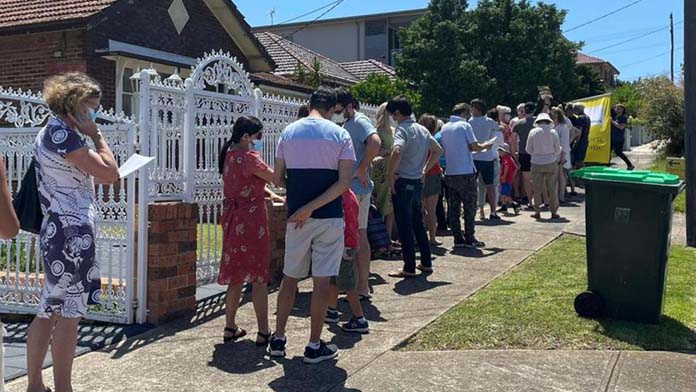Workers are still feeling the cost of living crunch, with Anthony Albanese refusing to do anything that would make a real difference.
Albanese is hinting that the May budget could extend last year’s power bill relief—but that only went to pensioners and people on income support.
Treasurer Jim Chalmers has tried to take credit for figures showing that wages are finally rising, after years of effective pay cuts due to prices rising faster than wages. On average wages increased 4.2 per cent through 2023, a fraction higher than the inflation rate of 4.1 per cent.
But in reality workers are still going backwards.
That’s because the official inflation rate, measuring increases in the cost of living, has a major flaw. Housing costs, both increases in mortgage repayments and rent increases, are simply left out.
Yet housing costs are one of the main reasons behind the surge in the price of living.
In the last two years the Reserve Bank has handed down 13 increases to interest rates, massively hiking home loan repayments. Monthly costs on the average mortgage have jumped $1500 as a result.
That produced a 40 per cent increase in repayments in the last year alone.
In Melbourne and Sydney, many people are spending half of their income on their home loan, according to AMP’s deputy chief economist Diana Mousina.
Rents were also up 8.3 per cent nationally in the last 12 months, and by more than 10 per cent in Melbourne, Sydney and Perth.
The result is that the cost of living for wage earning households climbed 6.9 per cent in 2023, far higher than both the official inflation rate and wage rises. This is based on the Bureau of Statistics’ own figures, which also calculate living cost indexes separate to the inflation rate.
Nor is the rising cost of housing just a result of the Reserve Bank jacking up interest rates. House prices have been rising dramatically for the last 20 years, from around three times annual income to over eight times income.
The surge in prices began after John Howard’s Coalition government introduced new tax breaks for housing investors, through changes to negative gearing and capital gains tax.
Housing became a speculative investment tool as investors rushed into the market, outbidding people looking for a place to live. Neither of the major parties have been prepared to do anything to fix this.
Labor promised modest changes to the tax breaks for investors at the 2016 and 2019 elections. But Anthony Albanese dumped these when he became leader.
Labor is determined to make sure housing investors never see prices fall—guaranteeing many young workers will never be able to afford a house.
Just since December 2019 house prices nationally are up a staggering 36 per cent.
Going hungry
Foodbank’s chief executive Brianna Casey told the ABC that it was no longer simply those on income support looking for emergency assistance, “We know that those who are experiencing hunger for the first time are increasingly younger, young professionals in particular,” she said. “They’re employed, they’re actually in the mid- to high-income bracket.”
Anyone on income support is seriously struggling to get by. “Almost three-quarters of people receiving income support are eating less or skipping meals due to the low rate of payments and rising cost of living,” according to the Australian Council of Social Service.
Single parent households in Queensland relying on income support are $250 a week behind what is needed for basic living expenses, a recent Queensland Council of Social Service report estimates.
A Senate Committee has now received over 900 responses from people on their experiences of the cost of living crisis. The responses show that constant stress about paying the bills, and the inability to afford to go out or take a holiday, is having a major impact on many workers’ lives.
“We have gone without most discretionary items. There is definitely no budget for a holiday, new clothes, or new appliances,” one person reported.
The cost of living crisis has had “a massive impact on our mental health. It’s been really difficult and [I] have sleepless nights thinking about how I’m going to pay the next bill”, he said. “We work hard and have a mortgage that is well below the median mortgage for Melbourne. We live in the outer suburbs, but only see a pretty bleak future at the moment.”
Many said the cost of petrol stopped them from going out. One person had not seen their family, who live 800 kilometres away, for three years as a result.
Labor could act to increase JobSeeker payments above the poverty line, build public housing and end the speculative rush into the housing market. But that would mean taking on the rich—and that’s something Albanese is determined to avoid.
By James Supple




